What’s been cracking in the world of business throughout March? We nailed down the most pressing news for Aussie small businesses (that might actually affect you).
We have the ATO chasing tax debts, the Fair Work Commission making decisions on the national minimum wage, and more steadying of interest rates and inflation.
Let’s dive in.

The ATO backtracks and calls in previously ‘written off’ tax debts
In a move that has raised eyebrows and stoked backlash from at least two federal Ombudsmen in a recent report, the ATO has resurrected old tax debts that had been previously ‘written off’.
The ATO is owed tens of billions of dollars in income tax debt, mostly by individuals and the self-employed. Despite being owed these sums however, many of these debts were previously written off as “uneconomical to pursue”.
Despite this, there has been a renewed pursuit of these debts by the ATO in a move criticised by some.
Thousands of Australian individuals and small businesses are now being hit with debts that they may have not been aware even existed – and were invisible on their MyGov account.
Many report that their tax agents informed them there was no debt. This is changing, threatening many with financial hardship, as interest is applied to these previously written off and often ‘invisible’ tax debts.
In a report issued by the Commonwealth Ombudsman and Taxation Ombudsman, there was criticism that the reactivation of very old debts was causing undue financial pressure and constituted an unfair practice.
“While the law may require agencies to take certain action, agencies are responsible for determining how they take that action in a way that minimises distress to affected and impacted people,” the joint report said.
Independent MP Andrew Wilkie also weighed in on the debate.
“The ATO should consider waiving a debt in extreme circumstances […] When these debts have been almost lost in history, when they haven’t appeared in (people’s) online accounts, and taxpayers have lost visibility of these debts, they shouldn’t then just out of the blue get a threatening letter saying that the money will be taken out of their next tax return,” Mr. Wilkie says.
The changes also affect many Australian small businesses, now that the ATO has reactivated and pursued billions of debt previously put on hold during the pandemicAll eyes will be on the ATO to see how they respond.

Unions set to battle businesses for rise to minimum wages and award pay
The Australian council of trade unions (ACTU) is pushing for a modest increase to minimum award rates. In an upcoming wage review the ACTU is pipped to negotiate a 5 per cent pay rise.
This would mean that the national minimum wage would be boosted from the current level of $23.23 per hour to $24.38 per hour.
The upcoming wage review will be conducted by the Fair Work commission, and the rulings would take hold from July 1 2024.
The wide-reaching review will affect close to 2.8 million award and minimum wage earners.
The ACTU’s position on the need for a wage increase is likely to be disputed by many business owners, who say they are operating in a high cost, low profit environment. However, the ACTU argues that low and minimum wage earners are being hit the hardest by inflation and require better pay to keep their heads above water.
The ACTU lodged a submission saying that business profits are “well above pre-pandemic levels” and that businesses could handle the rise.
All is not so clear, with data from the Australian Bureau of Statistics (ABS) telling us that Australian business profits fell by 0.6% in the year to December.
One of Australia’s largest business organisations, the Australian Chamber of Commerce and Industry (ACCI), has already countered the union’s call for 5 per cent, saying that the rise should be “not more than 2 per cent”.
The chamber’s chief executive Andrew McKellar spoke to reporters in Canberra, defending their proposed 2 per cent rise.
“What we are seeing is clearly a situation where wages are one of the persistent cost factors that businesses are facing at the moment,” said Mr McKellar.
“Let’s make sure that we still provide the conditions where business can be encouraged to employ people as much as possible.”
Let’s see how this plays out.

Will we soon see interest rates fall?
Sick to the back teeth of interest rate news yet? Relief may be on the horizon.
Markets have been buoyed by the RBA’s decision this month to keep interest rates steady at 4.35%. Amid slowing inflation, the conversation around the possibility of impending rate cuts has begun to increase in volume.
What are the loudest voices saying about possible cuts?
On one hand we have AMP chief economist Shane Oliver ruminating about cuts in June, the CBA talking about September, and economists from NAB chattering about November.
On the other hand, we have those like ANZ CEO, Shayne Elliott and HSBC chief economist Paul Bloxham reticent to believe they’ll come before 2025.
Of course, nobody out there is cradling a crystal ball, but such high-profile musing builds confidence that rate cuts are soon to be on the cards.
With many individuals and business owners dealing with mortgage stress, a rate cut may be welcome news indeed.

Leave a Reply